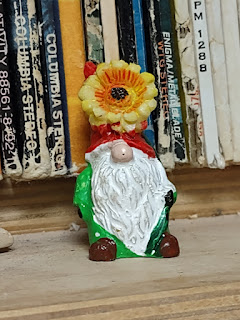For the past week, our neighborhood has been visited by a doe. So far, this lovely doe has grazed in our front yard, snoozed in the shade in the back yard and grazed in the side yard. Note: I live some twenty feet away from Cedar Mountain, and this photo was taken while I was walking home on 7/11/24, at a distance of about fifty feet, give or take.
Over the past fifteen plus years of writing, I have done research on a plethora of nouns and other assorted parts of grammar, both the old fashioned way and the modern way. By old fashioned, I mean waddling my butt down to the local library and thumbing through the Dewey Decimal card catalog to find a particular book or wandering through the library shelves looking for a particular subject {e.g. baby name books or classical literature}. And by modern, using both the Google and Bing search engines AND by asking people certain sensitive questions.
Let me clarify the statement of asking people sensitive questions. I was actually doing a bit of research as well as soliciting a bit of feedback while writing my first novel, and a former friend had pointed out that I was writing a few of my female characters unrealistically. She clarified when I asked how, which sent me on a very odd research mission that could've gone so terribly sideways if my coworkers didn't know that I was doing that serious writing gig.
T.L.;D.R.: I asked a coworker of mine about what the letters A, B, C, and D meant as it pertained to bra sizes.
Now, the other bizarre research question that stood out from that same time period had to do with breast milk. At the time, I was writing the original 1st draft of Hot Mess series, and I thought it would be really interesting if one of the main characters had the ability to produce breast milk at will. So I actually asked this question in a blog post from that same time period, and the consensus was that my readers were even more enlightened than I was on this particular plot device.
With the two person-to-person research questions out of the way, let's discuss the overall oddity of what research I actually performed for my various stories.
In general, because I was such an early fan of having hybrid people {half human/half animal} in my stories, that required quite a bit of research into the lives of the various members of the feline species, both domesticated and wildlife. This animal research obviously involved other species such as horses and other types of wildlife.
We then went off on a small mechanical tangent doing basic research for certain cars and motorcycles (how to drive a true manual motorcycle was an adventure, since the required info translated to just one measly sentence in the aforementioned first novel). With my current book that is now out, that research delved into about a half dozen types of cars before splintering off to other things like...
Nature. I'm a big fan of Mother and Father Nature, to the point where I often write various parts of that charming couple as anthropomorphic beings. We've also done a large chunk of research into one of my very favorite topics...
Religion. Specifically, the aspects of what I consider to be very malleable to play around with: Hell and Purgatory. Oddly enough, I have always been drawn to those two members of the afterlife than I have to Heaven, probably because they've been more interesting to doodle around with. When I got more serious about my writing, those two particular topics opened my fictional world to endless possibilities.
Possibilities like, Hell being run like a well oiled family business in my current series, military style. Or in my recently released novella, the main villain is a modern day version of Satan. But seriously, I did do a moderately deep dive in both concepts, as well as a few of the archangels.
People. This one was one of my bigger research projects that is perpetually ongoing, with the methodology being almost even divided between asking people, observing people and the strange world of the Internet. The observing and the asking people almost exclusively dealt with clothing and everything associated with it, with a few related tangents such as body art (metal and inking) and hair; while the Internet was used to basically brush up on a few historical generalities, like different cultural time periods (e.g. the Aztecs, Incas and Mayans), certain pop culture events (e.g. the world famous "Don't Ask, Don't Tell" policy of the 90's) and even certain mores/values of a given time period. Using the Internet also allowed me to confirm certain things like...
My memory. This is an interesting research topic, as a lot of the background info that I use for my stories involve my home state of Connecticut. I've done a lot of intra-state traveling in my lifetime, and a moderately sized chunk has made it into my stories, either as a major part or a minor touching upon.
For example, in a novella that I'm looking at a 2025 publishing date, I have references pertaining to Connecticut sprinkled throughout. Like, a major highway and state routes that run South-to-North and from North-to-South; I've used a few major towns and cities as minor-to-major focal points; I have used an semi-abandoned hospital and my local mountain as key turning points.
In another example, two stories within this particular trilogy, take place in my local park and local library, while the other takes place at the local town festival; while in another short story collection, one story takes place inside my local mountain and the other takes place, weirdly enough, in the center of town and my house.
One topic I do enjoy researching is names. I was never that much of a fan of using regular names for my characters. I was more in the realm of either using mythological names, old fashioned names, regular names that are misspelled, names based on other languages or names based on different types of nouns.
We delved deep into various kinds of mythology: Roman, Greek, Incan, Celtic and Christian. We dabbled a bit in the Victorian age, The Edwardian age, other languages and the classic cartoon age. And because a few of my female characters from my current WiP are a neat-o mixture of amoral/psychopath/sociopath, we researched a few various plants of the mortally dead variety, like various off-shoots of Nightshade. So those particular characters are named after Atropa Belladonna & Brugmansia, two very lethal members of that particular genus.
In regards to classic cartoons, back in the day, I watched (and still do) a ton o' Looney Tunes/Merrie Melodies cartoons, and I grew to appreciate some of the very old fashioned names used, so I decided to use a few of them on my secondary characters.
Finally, as odd as this sounds, especially since I do not write the type of fiction this knowledge would be needed for, I did quite a bit of research on the human body (almost exclusively internal). For better or worse, I have a slightly above average quantity of violence (both gratuitous and non) in my stories, which required me to have an above average understanding of the human body.
So not as to not gross anyone out, I now have a passable understanding of the human body as it pertains to my type of writing. I know it's something one shouldn't really brag about, but for better or worse, it's something that I managed to cultivate over the years and successfully apply to my storytelling.
Grammar. I am a lover of the English language (mostly American but some occasional forays into British), but it became a full bloom passionate love affair (shhh...don't tell my muse nor my wife) once I began blogging/writing in 2008. I absolutely fell in love with the dictionary and thesaurus, and was always on the lookout on how to properly work in different words to express the same thoughts without turning any reader off. I simply started with reworking old cliches/adages and it just blossomed from there, to the point where I liberally sprinkle viable words that actually mean/say something in my stories. Grammar is the be all to end all when it comes to writing.
I think that about covers all of the very odd research I have done, and still do, for the stories that I create. So, what kind of research that people have looked at you rather oddly, that you have done for your writing?
{c} 2024 by G.B. Miller. All Rights Reserved













